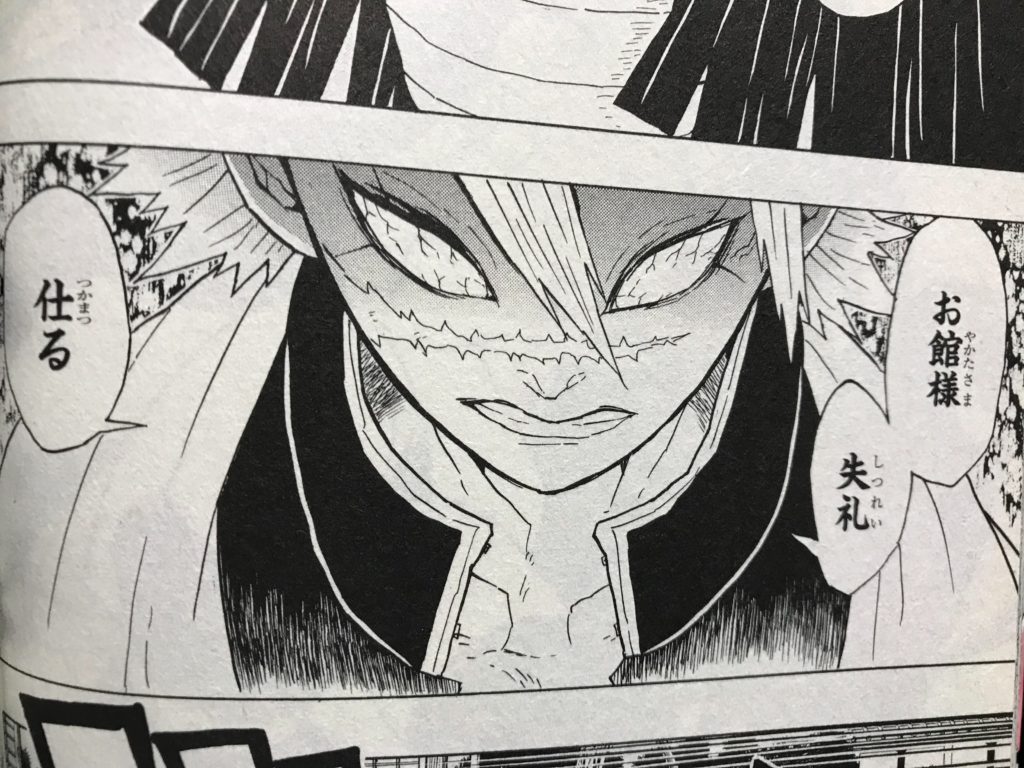Welcome to Kimetsu no Japanese, a site for learning Japanese from a manga Demon Slayer.
Today’s topic
Ch.47 Vol.6
Sanami Shinazugawa (不死川 実弥)
お館様 失礼仕る
My apologies… Master. I serve you.
Reference source : 五峠呼世晴 (2017) 鬼滅の刃6 集英社
Reference source :KOYOHARU GOTOUGE. (2019). DEMON SLAYER : KIMETSU NO YAIBA. VIZ Media, LLC

Shinazugawa is one of the rough characters in Demon Slayer. He could not accept Nezuko because of her nature (demon) and tried to prove that she eats humans.
His way of talking is rude and quite dirty but when he talks to Oyakata-sama, the head of Demon slayer corps, he really decent. He has royalty like a samurai.. this gap makes him an attractive character.
This is one of the sentence he said to Oyakata-Sama, when he decided to enter the room Oyakata-Sama sits in…
Lesson
| JPN | お館様(やかたさま) 失礼(しつれい) 仕(つかまつ)る |
| JPN♪ | oyakata-sama, shitsurei tsukamatsuru. |
| ENG | I apologize for my rudeness. |
| WORD | JPN♪ | MEANING |
|---|---|---|
| お館様 | oyakata sama | Lord, Master |
| 失礼 | shitsurei | rudeness, bad manner, impoliteness |
| 仕る | tsukamatsuru | to do something (humble, old-fashioned) Samurai used to use this word for superiors. |
Explanation | “仕る (tsukamatsuru)”
This is an old polite phrase.
“Tsukamatsuru” sounds cool but we can hear it only in the historical dramas. Maybe you can use it when you want to make people laugh!
Shinazugawa said this phrase for entering oyakatasama’s room and for apologizing his rude actions in advance.
It makes sense together with 失礼(shitsurei) and 仕る(tsukamatsuru)
In the comic book, “shitsurei” and “tsukamatsuru” are translated separately, but I thought it would be better to tie them into the phrase “失礼仕る” and translate it as “I apologize for my rudeness” in this situation.
仕る(tsukamatsuru) actually has a meaning “to serve someone” but in this phrase this word is connected with “shitsurei”. When “shitsurei” and “tsukamatsuru” are tied, it becomes a very humble expression of excuse or apology. Also it was used when samurai enters into / leaves a place.
So, “Shitsurei tsukamatsuru” is used for “excuse me”, “I apologize my rudeness” and “I’m leaving (good-bye)” … if you have a chance to watch Japanese samurai movie, you may hear “失礼仕る(shitsurei tsukamatsuru)” sometimes.
How to say 失礼仕る today?
As said before, we don’t use 失礼仕る today. Even in most polite situations.
We say “失礼します(shitsurei shimasu)” or more politely “失礼いたします(shitsurei itashimasu)” for “excuse me”.
It’s a little sad that cool old-fashioned words have become obsolete, but it’s no way, a language is a living thing and it changes constantly.
さようなら(sayonara = Good-bye) came from 失礼仕る!?
Most of people may have heard this Japanese word “sayonara” for good-bye, but did you know this word came from today’s topic “shitsurei tsukamatsuru”?
More exactly “左様ならば、失礼仕る(sayonaraba, shitsurei tsukamatsuru)”.
This phrase was used when samurai was about to leave someone’s place.
“Sayonaraba” means “Because the situation is like this” or it can be daringly translated as “Because it is a good timing”.
Worldwide-known phrase “sayonara” was originally a samurai phrase!
If you don’t know about this fact it doesn’t matter though, but it’s not that bad to have this knowledge as one of your trivia.
That’s all!
In Taisho era, the background of this manga story, the title of “bushi (samurai)” was already lost but this Shinazugawa’s phrase reminds us of samurai. (Although he was NOT samurai.) Samurai usually had high feelings of loyalty to their master, as Shinazugawa.
Anyway, he was still rude enough to enter the room with his shoes on!
I thought “take off your shoes in Oyakata-sama’s room!”…



Comment